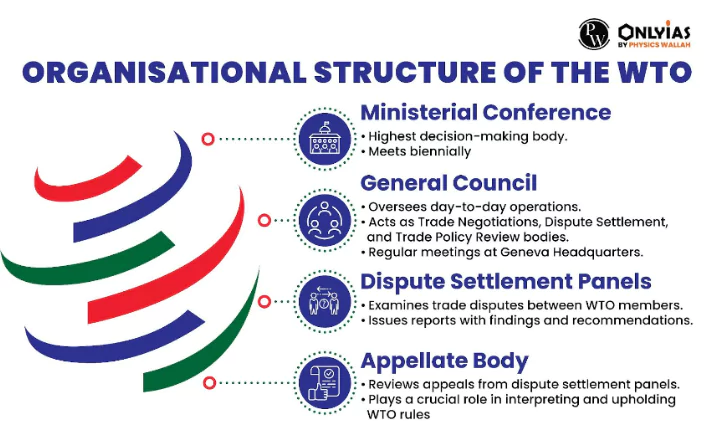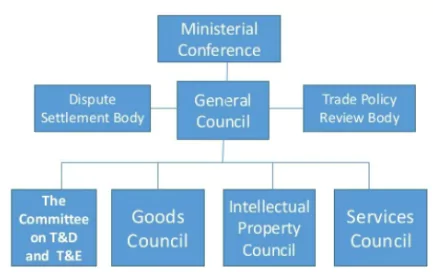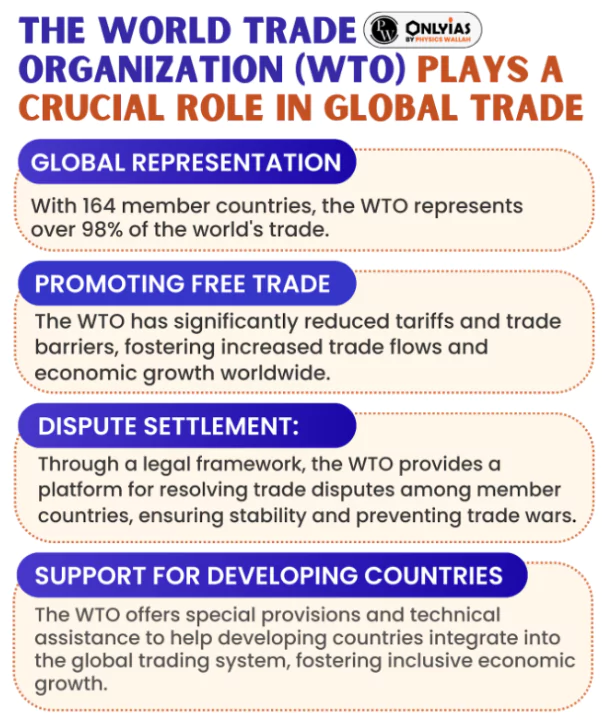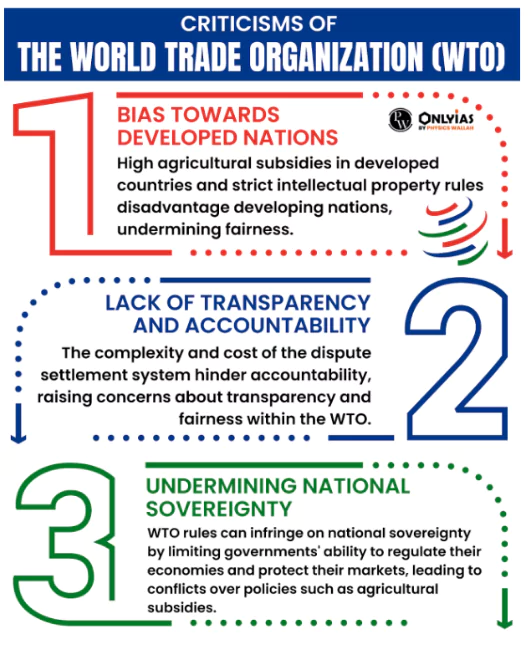Context
This Article is based on the news “Restoration of fully functional dispute settlement system of WTO top-most priority, says India” which was published in the Indian Express. Recently, The 13th Ministerial Conference (MC13) of WTO was organized in Abu Dhabi from 26 February to 29th February 2024.
Relevancy for Prelims: General Agreement on Tariffs and Trade (GATT), Agreement on Agriculture (AoA), General Agreement on Trade in Services (GATS), Trade-Related Aspects of Intellectual Property Rights (TRIPS), Appellate Body (AB) of WTO, Special Safeguard Mechanism (SSM), Global Trade Challenges, outcome of 13th Ministerial Conference
Relevancy for Mains: Public Stockholding and Food Security, Technology Transfer and Global Trade, Dispute Settlement Mechanism of WTO, WTO’s Engagement with Non-Trade Issues, Trade Negotiations and Multilateral Trading System, 13th Ministerial Conference suggestion. |
India’s Advocacy for a Permanent Solution to Food Security Challenges at WTO 13th Ministerial Conference
- India has called for finding a permanent solution to the issue of public stockholding for food security in the ministerial-level meeting of the World Trade Organisation (WTO) in February 2024
WTO 13th Ministerial Conference Highlights: New Members, India’s Concerns, and Brazil’s Calls for Action
- New WTO Members: Comoros and Timor-Leste formally joined the World Trade Organisation on the opening day in Abu Dhabi, becoming the 165th and 166th members of the body at the 13th Ministerial Conference of WTO.
-
Service Domestic Regulations Outcome:
- New disciplines on services domestic regulation, announced at the 13th Ministerial Conference.
- The disciplines will be applied on a “most-favoured nation” principle, meaning that they will benefit all the WTO members.
-
Economic Impact of Disciplines:
- It is expected to lower trade costs by over USD 125 billion worldwide.
- New research by the WTO finds that their implementation will help to reduce services trade costs by 10 per cent for lower-middle income economies and 14% for upper-middle income economies, with overall savings of USD 127 billion.
- By 2032, global real income is projected to increase by at least 0.3%, representing USD 301 billion and global service exports are expected to rise by 0.8%, amounting to USD 206 billion.
-
Navigating the WTO Agenda: India’s Perspectives on Multilateral Trade and Non-Trade Issues
- Multilateral Trading System: India mentioned the need to avoid fragmentation of the multilateral trading system and the importance of remaining focused rather than mixing non-trade issues with the WTO agenda.
- Sustainable Programs: India explained it has propagated a sustainable way of living based on traditions and values of conservation through a mass movement for LiFE – “Lifestyle for Environment” a key to combating climate change.
- Non-Trade Issues: India stressed that non-trade issues have the potential to encourage trade distortive subsidies and non-trade barriers.
- Bringing issues like Gender and MSMEs into the realm of WTO discussions was not practical because these issues were being discussed in other relevant international organisations already.
- Issues like Inclusion: India stressed that such issues are better addressed through contextual and targeted national measures and they did not fall in the domain of international trade relations.
- Restoration of Appellate Body: India stressed the restoration of the Appellate Body, which has been inactive since December 2019.
- Opposed IFD: India and South Africa blocked a key proposal led by China at the WTO, known as Investment Facilitation Development Agreement (IFD).
What is IFD?
- Proposed in: 2017
- About: IFD aims to streamline investment procedures and facilitates cross-border investments.
- Criticism: Potentially favouring countries heavily reliant on Chinese investments and those with sovereign wealth funds.
Why does India oppose it?
- India argued that IFD falls outside the scope of the WTO, as it is not strictly a trade issue beyond the scope of the Marrakesh agreement.
- India pointed out that the IFD does not fulfill the criteria for a formal agreement as it has not received unanimous support from all WTO members.
|
-
Global Trade Challenges: Brazil’s Push for Technology Transfer and Agriculture Reforms in WTO at 13th Ministerial Conference
- Technology Transfer and Agriculture Subsidy: Brazil emphasised the critical need for the WTO to facilitate the transfer of essential technologies to developing countries, particularly for pandemic preparedness, climate mitigation, and energy transition.
- Cap and Reduce Agriculture Subsidies: Brazil emphasised the criticality of progress in agriculture negotiations. It called for instructions to cap and reduce trade-distorting agricultural subsidies, which adversely impact the food security of all the WTO members.
- Fisheries Subsidies: Brazil reiterated its strong commitment to negotiations on fisheries subsidies, underscoring the importance of addressing the issue to promote sustainable fishing practices globally.
- India’s Stand on Fisheries Sector: India underscored the importance of considering diverse fishing practices and the livelihoods of local fishermen with Exclusive Economic Zones.
- 25 Year Moratorium on Subsidies: India also urged for a 25-year moratorium on subsidies for distant-water fishing activities, citing their adverse effects on sustainable fishing practices.
About World Trade Organisation (WTO):
- WTO is the only global international trade organisation which deals with rules of trade between nations.
- It is governed by different agreements negotiated and signed by participating nations and ratified in their parliament.
-
Historical Background: From GATT to the Birth of WTO
-
- The WTO commenced operation on 1st January 1995, under the Marrakesh Agreement, signed on 15 April 1994 by 124 nations.
- It has replaced the General Agreement on Tariffs and Trade (GATT) which commenced in 1948.
- Most of the issues focused by WTO are derived from previous trade negotiations, especially from the Uruguay Round (1986-1994).

Marrakesh Agreement:
- Formally known as the Agreement establishing the WTO.
- It was signed in Marrakesh, Morocco, on April 15,1994 by 123 nations
- It culminated in an 8-year round of multilateral trade negotiations.
- It paved the way for the creation of WTO, replacing GATT.
|
-
Roles and Responsibilities: WTO’s Functions in International Trade
- Promoting Free Trade: Establishes and uphold trade rules like non-discrimination and transparency. Also, it reduces barriers like tariffs and quotas.
- Resolving Trade Disputes: Offers a legal framework and process for settling trade disputes peacefully. It also provides a platform for negotiations and mediations between trading partners.
- Supporting Economic Development: Integrates developing countries into a global trading system. Offers special provisions and flexibilities for developing countries, famously known as special and differential treatment provisions.
- Engaging in Global cooperation: WTO collaborates with other international organisations like IMF and world bank to address broader economic challenges like poverty reduction etc

-
Ministerial Conference of the WTO:
-
- The Ministerial conference of WTO is the heart of its operation. By now the WTO has held 12 ministerial conferences. The last meeting was held between 12-17 June 2022. It took place at WTO headquarters in Geneva.
- The conference was chaired by Timur Suleimenov, Deputy chief of staff of the Kazakhstan president.
- The 13th Ministerial conference is scheduled to take place at Abu Dhabi from 26 to 29 Feb 2024.
- It will be chaired by Dr Thani bin Ahmed Al Zeyoudi, minister of state for foreign trade of the United Arab Emirates.
Key WTO Agreements: Shaping Global Trade Rules
-
General Agreement on Tariffs and Trade (GATT):
- Signed in 1947 by 23 nations after the 2nd world war.
- Aimed to reduce tariffs and other barriers to promote trade among nations.
- Its limitations led to the Uruguay round negotiations, culminating in WTO in 1995.

-
Agreement on Agriculture (AoA):
- The Agreement on Agriculture (AoA) is an international treaty of the WTO.
- Objective: To reduce govt support and subsidies given to domestic agricultural producers.
- The agreement on agriculture consists of three pillars:
- Domestic Support: It calls for reduction in domestic subsidies that distorts free trade and fair price.
- The forms of subsidies are basically given under Agreement on Agriculture. They are Green Box, Amber Box and Blue Box subsidies
- Market Access: Market access for goods in the WTO means the conditions, tariff and non-tariff measures, agreed by members for the entry of specific goods into their markets.
 Export Subsidies: Government support that lowers export costs, including input subsidies, remission of import duties, and other export incentives, falls under export subsidies.
Export Subsidies: Government support that lowers export costs, including input subsidies, remission of import duties, and other export incentives, falls under export subsidies.
-
General Agreement on Trade in Services (GATS):
- It is a treaty of the WTO that came into force in January 1995 as a result of the Uruguay round negotiations.
- It was created to extend the multilateral trading system to the service sector, in the same way GATT provides for merchandise trade.
- It covers most service sectors, requiring member countries to open their market and treat foreign providers fairly.
-
The Agreement on Trade Related Investment Measures (TRIMS):
-
- The agreement was negotiated during the Uruguay round, and applies only to measures that affect trade in goods.
- Recognising that certain investment measures can have trade-restrictive and distorting effects, it states that no members shall apply a measure that is prohibited by the provisions of GATT in Article 3 (national treatment) or Article 9 (quantitative restrictions).
About G33 Countries:
- The G33 (or the Friends of Special Products in agriculture) is a coalition of developing and least developed countries.
- There are currently 48 member nations including China, Cuba, India, Indonesia, Nigeria, Pakistan etc.
|
WTO Challenges: Navigating Public Stockholding, the Peace Clause, and Agricultural Subsidies Framework
-
Issues with Public stockholding:
- Distort Trade: The WTO maintains that PSH programmes distort trade, especially when implemented without limitations.
- Current WTO Rules: The Agreement on Agriculture (AoA) limits PSH programs to 10% of a country’s production for domestic consumption. Objection by G33 countries: The G33 countries object to the outdated method used by the WTO to calculate subsidy levels, which does not account for inflation.
- Outdated Methodology: This methodology of subsidy calculation is based on the price index of 1986-88, which does not take into account inflation.
-
Issues with the peace clause
- Controversial: Some developed countries argue that it gives developing countries an unfair advantage, and it could lead to trade distortions. Others say it is crucial for developing countries to meet their food security requirements.
- Flexibility in rules-based order: WTO is a rules based organisation, and the peace clause is seen as a departure from those rules. The flexibility provided by the WTO in the peace clause is leading to conflict of interest between developed and developing nations.
-
Peace Clause
- It was the 9th ministerial conference held in Bali, Indonesia in 2013.It resulted in the adoption of a series of agreements on several trade issues, including the Peace Clause.
- It was put in place in 2013 under the Bali Agreement.
- It permits developing nations to exceed the 10 percent ceiling without facing legal action by other members.
| Public Stockholding: It is a policy in which the government purchases and stores food staples to ensure their availability at affordable prices. It is used as a tool by many developing countries to mitigate food crisis caused by price vitality and food insecurity
Example: The MSP scheme. |
-
Issues with Agricultural Subsidies Framework:
- Subjectivity in Green Box Subsidies: The categorization of subsidies into Green Box, deemed to cause minimal trade distortion, introduces subjectivity. Disputes often arise due to varying interpretations of the “minimal” level, causing tensions between nations.
- Lack of Transparency in Calculations: The criteria and calculations defining Green Box eligibility lack transparency.
- Developing Country Exemptions: While developing countries benefit from higher Amber Box limits, this creates an uneven playing field for developed nations. Concerns about fairness emerge as exemptions can potentially distort competition and trade dynamics.
-
Issue with Appellate Body:

-
- US Obstructionism: The US has single-handedly blocked the appointment of new members to the Appellate Body (AB) since 2019, rendering the Dispute Settlement mechanism (DSM) ineffective.
- WTO Toothlessness: Without a functioning AB, countries can easily avoid complying with panel rulings, undermining the WTO’s dispute resolution process.
- De-judicialization: The US’s desire to de-judicialize its international trade relations raises doubts about the full restoration of the AB.
- About Appellate Body:
- It was established in 1995, and is a standing body consisting of 7 members, each serving a limited 4-year term.
- Its primary function is to hear appeals from dispute reports issued by panels in cases brought forward by WTO member countries.
- Special Safeguard Mechanism (SSM): It is a tool to counter import surges that may put agricultural production in developing nations at risk.
- As per the current Agreement on Agriculture (AoA) design, only 39 members, predominantly developed countries, can use Special Safeguards (SSGs).
- The SSM aims to extend similar measures to developing countries.
Way Forward: India’s Proposals for Addressing WTO Challenges and Agricultural Reforms
- Modification of formula to calculate food subsidy cap: India suggested measures like amendments to calculate the food subsidy cap and inclusion of programmes implemented after 2013 under the ambit of the ‘Peace Clause.’
- Updation of the external reference price (ERP): India emphasizes on the need to update the external reference price (ERP) from 1986-88 levels to current market rates.
- It should account for inflation when determining the MSP ceiling.
- Three-year average price of a crop: Using the three-year average price of a crop based on the preceding five-year period excluding the highest and lowest entries for that product.
- Subsidy calculations need to be based on actual procurement rather than encompassing all eligible production.
- Allowing PSH Programs: Public stockholding programs designed for food security objectives should be permitted and deemed compliant with World Trade Organization rules under certain conditions. These conditions include:
- Ensuring that stocks acquired through PSH do not distort trade or harm the food security interests of other World Trade Organization members.
- Members should refrain from exporting stocks acquired, except for international food aid and non-commercial humanitarian purposes.
- Special Safeguard Mechanism: Countries should have the right to protect their domestic markets from dumping by other countries through the Special Safeguard Mechanism.
- Joining MPIA: Developing countries could join the European Union-led multi-party Interim Appeal Arbitration Arrangement (MPIA) to formalize an ad hoc appellate review. However, this lacks the binding nature and predictability of the original Appellate Body (AB).
![]() 1 Mar 2024
1 Mar 2024



 Export Subsidies: Government support that lowers export costs, including input subsidies, remission of import duties, and other export incentives, falls under export subsidies.
Export Subsidies: Government support that lowers export costs, including input subsidies, remission of import duties, and other export incentives, falls under export subsidies.